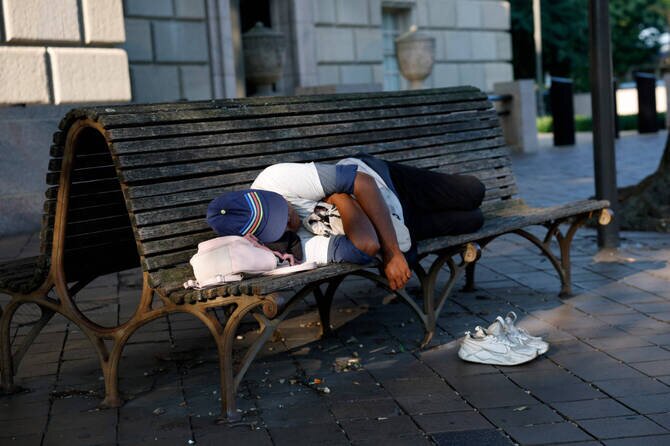
Critics Blast Trump's Executive Order on Homelessness
Leading Democrats and advocates argue that the order relies on harmful strategies and may exacerbate the crisis.
President Donald Trump has recently signed an executive order aimed at addressing homelessness by prioritizing funding for cities that implement stricter measures against open drug use and street camping.
The order emphasizes making people feel safer, but critics, including leading Democrats and advocates, argue that these strategies are ineffective and may worsen the crisis.The executive order directs several Cabinet heads to allocate funds to cities that crack down on homelessness, with the goal of restoring public order by placing individuals in long-term institutional settings for 'humane treatment.' Homelessness has become a pressing issue in recent years due to rising housing costs and increased drug addiction and overdoses.
The president's order may target liberal cities like San Francisco, Los Angeles, and New York, which Trump perceives as lenient towards street conditions.However, many of the concepts proposed by Trump have already been tested or are currently in use in California.
Governor Gavin Newsom has directed cities to clean up homeless encampments and invested more funds into addiction and mental health treatment programs.
His office stated that Trump's order relies on harmful stereotypes and focuses on creating 'distracting headlines and settling old scores.'San Francisco Mayor Daniel Lurie emphasizes the importance of clean streets, while San Jose Mayor Matt Mahan recently implemented a policy that makes jail an option for individuals who reject shelter offers.
Trump's executive order tasks officials to prioritize grants for states and local governments that enforce bans on open drug use and street camping.Conservative policy group Cicero Institute supports the order, stating that it sends a clear message to communities resistant to policy shifts.
However, critics argue that forced institutionalization is not an effective solution due to moral, legal concerns, and high costs.
Instead, they propose working with homeless individuals to provide shelter or housing, emphasizing that punishment will not solve the problem.
The order emphasizes making people feel safer, but critics, including leading Democrats and advocates, argue that these strategies are ineffective and may worsen the crisis.The executive order directs several Cabinet heads to allocate funds to cities that crack down on homelessness, with the goal of restoring public order by placing individuals in long-term institutional settings for 'humane treatment.' Homelessness has become a pressing issue in recent years due to rising housing costs and increased drug addiction and overdoses.
The president's order may target liberal cities like San Francisco, Los Angeles, and New York, which Trump perceives as lenient towards street conditions.However, many of the concepts proposed by Trump have already been tested or are currently in use in California.
Governor Gavin Newsom has directed cities to clean up homeless encampments and invested more funds into addiction and mental health treatment programs.
His office stated that Trump's order relies on harmful stereotypes and focuses on creating 'distracting headlines and settling old scores.'San Francisco Mayor Daniel Lurie emphasizes the importance of clean streets, while San Jose Mayor Matt Mahan recently implemented a policy that makes jail an option for individuals who reject shelter offers.
Trump's executive order tasks officials to prioritize grants for states and local governments that enforce bans on open drug use and street camping.Conservative policy group Cicero Institute supports the order, stating that it sends a clear message to communities resistant to policy shifts.
However, critics argue that forced institutionalization is not an effective solution due to moral, legal concerns, and high costs.
Instead, they propose working with homeless individuals to provide shelter or housing, emphasizing that punishment will not solve the problem.











